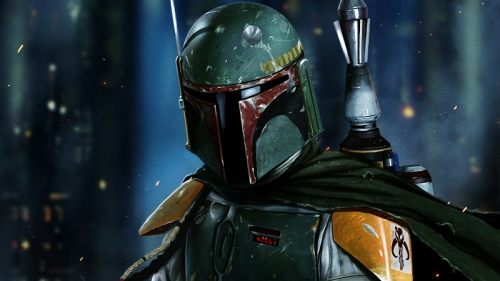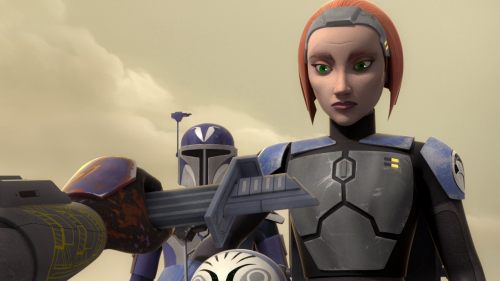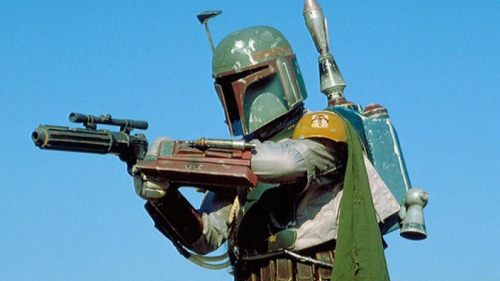STAR WARS, Storytelling, And Fixing It In Post
This article contains spoilers for Star Wars: The Force Awakens, and wild speculation about its creative process.
J.J. Abrams is lucky Star Wars: The Force Awakens is such a fast, fun movie. Without the film’s breathless pacing and wide-eyed sense of adventure, audiences would be forced to acknowledge its array of storytelling contrivances and conveniences. But I can’t get mad at Mr Abrams about those issues - rather, I kinda sympathise. To really get to the bottom of The Force Awakens’ story problems, you need to understand a painful truth about the filmmaking process:
Sometimes you fuck it up.
I don’t know how Abrams believed he fucked things up. Maybe the film didn’t move fast or smoothly enough. Maybe it didn’t make sense. Maybe Lucasfilm wanted to save stuff for sequels. But Abrams (or Kathleen Kennedy) clearly did believe he fucked things up, as hasty fixes were obviously deployed in production and post production to rebuild the story. The result is a movie cobbled together out of multiple versions of the script (see The Art of Star Wars: The Force Awakens for more) and even of the production footage. When you watch the movie, you can occasionally feel that something just isn’t right. I guarantee you that J.J. Abrams feels it too.
Now, I don’t want to be the guy who says “you can’t understand cinema until you’ve made a film,” because you totally can. But while you can identify filmmaking mistakes as a critic, as a filmmaker you feel them in your bones because you’ve probably made them too. You feel them in the weird omissions of information; in the equally weird over-explanation of other information; in the unmotivated cuts in the middle of scenes that could only exist to mask rewritten dialogue. Given that my only feature to date is Ghost Shark 2: Urban Jaws, which made all those mistakes and more, suffice it to say that I recognised nearly every mistake in The Force Awakens. And though our movie operated on a grossly different scale and timeline, I suspect that the creative problems were rather similar.
Nothing quite compares to the feeling of despair when you first sit down and watch an assembly of your movie and realise that it doesn’t work. Upon that realisation, you’ll do anything to make it work - even if it means chopping up and re-assembling the very bones of your story. Sometimes it feels like grasping desperately for a handhold while slipping off a ledge - and sometimes the resultant movie feels the same way.
Let’s use Maz Kanata as a case study.

Abrams has said that originally Maz joined the gang at the Resistance base, but those scenes were cut because they were deemed to do “nothing of value.” But those scenes also featured Maz presenting Luke’s lightsaber to Leia (and thus Finn), so further scenes had to be shot to cover that hole. That’s likely also related to Rey’s weirdly rapid change of heart in Kanata’s basement. Rey literally runs away from adventure in a way that feels perfunctory and out of character. Her reaction completely clangs with her so far excited, Jedi-mythologising character (who, importantly, was originally written as desperate to leave Jakku behind). It’s presumably designed to give Rey her “refusing the call” moment and shuttle her to the next plot point (her abduction), but it’s so short-lived that it feels like a clumsy patch-up job.
Patch-up jobs are everywhere in The Force Awakens. There are instances where characters go from point A to point C without hitting point B - in a way that in the moment just scrapes by, but doesn’t stand up to scrutiny. Poe randomly showing up at the Resistance base? He was originally meant to die in the first act, so the connective tissue to get him to safety just wasn’t there. (What a terrific pivot it would have been to introduce that character then have Finn take over - but then fanfic writers would miss out on Poe/Finn possibilities, I guess.) It’s also why Maz Kanata suddenly disappears out of the movie - she originally stuck around, so there just wasn’t a farewell shot for that character.
We had similar problems on Ghost Shark 2. Some plotlines didn’t work (they slowed down the movie, confused the plot, or just sucked), so they were cut, which introduced more problems. There are a bunch of narrative jumps in the movie - particularly in the third act, which originally had a significant subplot that got more or less axed. In those cases, you basically have to ask the audience to go along with it. That's practically JJ Abrams' modus operandi.
As for the strange treatment of Rey’s character, there are different issues going on there. It’s boring to ask whether or not Rey is a Mary Sue or some bullshit like that. More interesting is how and why her backstory has been obfuscated to the audience.
Mystery is among the hardest things to do in storytelling, and one of the most vital. Any story, to an extent, is just the slow reveal of information. When do you tell your audience this thing? Or this other thing? What’s relevant to what other thing? What depends on this other thing to work? It’s a difficult balancing act - one The Force Awakens sort of wobbles on.
At several points, we clearly should be learning more about Rey, dramatically speaking, but the information is denied us - presumably to set up reveals in future films. Maz Kanata’s sequence (again!) stands out as being particularly odd. Rey’s flashback sequence - originally telling a more complete story of both Rey and the lightsaber - smacks of the filmmakers equivocating on how much information to tease out. Maz seems to know something of Rey’s background, but she doesn't let on. And again, this is speculation, but the shared moment between Rey and Luke in the final sequence is performed by both actors with far more emotional weight than what the movie tells us the moment has. That’s either a result of poor direction or rewrites, and given Abrams' skill with actors, it's probably rewrites.
On Ghost Shark 2, we had a similar issue with a key piece of backstory that we needed for plot purposes, but whose specifics proved a distraction. Going too far towards explanation resulted in inordinate screen time being spent on unimportant details; too far in the other direction, and the story felt like a mystery where it wasn’t supposed to. There’s a sweet spot in the middle where you’re teasing out just enough information - that’s where you always want to be. The Force Awakens feels like it’s pulling too far towards “mystery,” either to keep the audience guessing or just to cover up the story Spackle.

The worst thing about fixing story in post is that what seems to be a little fix can have a disquieting domino effect on the rest of the story. George Lucas has been quoted as saying, upon seeing the final edit of The Phantom Menace, that “you almost can’t take any of those pieces out of there now, because each one kinda takes you to the next place, and you can’t jump [from one to the other].” That’s true! Often a problematic scene contains vital information or motivation for elsewhere in the film, and removing it requires you to rework other scenes, which then force a need for further reshoots, or hasty ADR lines, or what have you. Sometimes it actually is better to just jump from point A to point C, and trust the audience will fill in the blanks. They usually do, but that doesn’t make them not aware, on some deep level, that the blanks were there.
The root problem of all this is, of course, inadequate time spent on the script, and/or insufficient confidence in the story. On Ghost Shark 2, our fundamental mistake was setting ourselves an unreasonable deadline and leaving the script half-baked. Similarly, Abrams and Lawrence Kasdan's rewrite of Michael Arndt’s original Episode VII screenplay was supposedly the reason for the film’s six-month delay, but it clearly wasn’t enough - the story continued to morph and change even after production started, which is a dangerous proposition. Abrams and Kasdan had to juggle action sequences that were already designed (like the Falcon crash, which was originally framed as a total accident) and squeeze a new story into a pre-existing box. We ended up blowing past our deadline by four years, but Abrams and co didn’t have that option.
If we wrestled with these issues on a film as small as Ghost Shark 2, I can only imagine the hair-pulling creative fuckstorms that went on behind the scenes on The Force Awakens. Having to juggle the introduction of between four and ten major to semi-major new characters, and involving a whole cast of pre-existing characters, while also catching the audience up on 30 years of backstory and setting up the foundation for a new trilogy, must have been an absolute nightmare. Story rewrites get tougher the more characters and plotlines intersect, and The Force Awakens is stuffed full of them. A New Hope feels like a children’s storybook by comparison.
But you know what? I’ve seen The Force Awakens twice already, and I’m planning to see it again. I know I’ll be a happy person for at least those two hours, going on a brisk adventure with a bunch of fictitious friends. That probably came out sounding bleaker than it was intended to, but the point remains: the movie gets by. I still feel the story tugging awkwardly at itself, but the cast and the sense of fun ultimately win me over. And I’m at peace, knowing that titans like JJ Abrams still make the same storytelling blunders everyone else does.
And speaking of blunders: if you’re burned out on Star Wars, you can buy or rent Ghost Shark 2, if you like.




